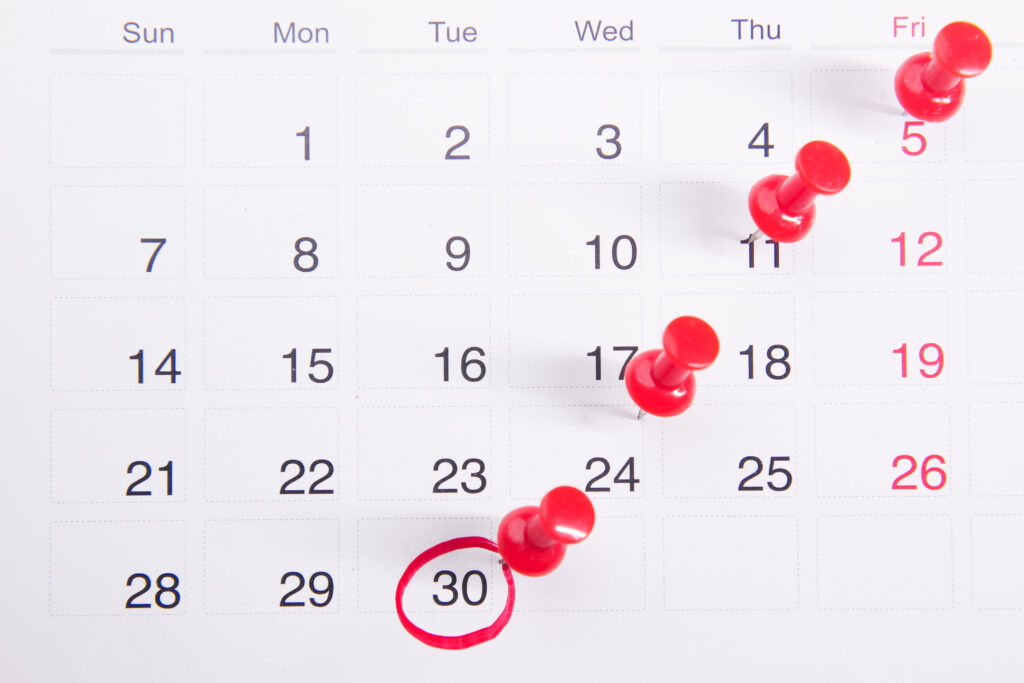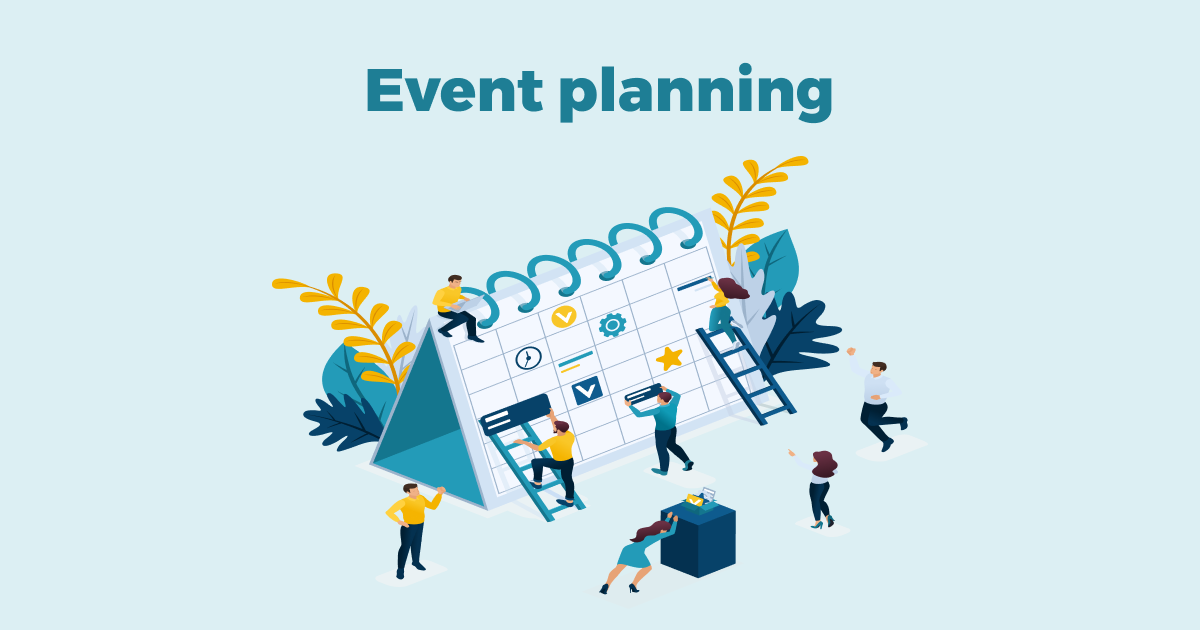Have you ever been amazed by events that run so smoothly and wondered how it’s all done?
The secret is event planning, a detailed craft that turns dreams and ideas into reality.
So, what exactly is event planning?
Don’t worry. It’s not some mysterious code that only fancy party people know. In this post, we’ll break down the process of event planning into simple, manageable steps, empowering you to plan your event with confidence and success. Let’s dive in!
Table Of Contents
- What Is Event Planning?
- Why Is Event Planning Important?
- A Step-by-step Guide To Plan A Successful Event
- Event Plan Example
- Key Takeaways Of What Is Event Planning
- FAQs About What Is Event Planning
What Is Event Planning?
As a significant part of event management, event planning is about carefully designing and organizing an event from start to finish. It involves choosing the location, deciding on the budget, arranging the schedule, working with vendors, creating the event setup, and paying attention to all the small details to make the event a success.
The goal of event planning is to bring a specific vision or idea to life and ensure that the event meets its objectives, whether it’s celebrating a milestone, promoting a cause, networking, fundraising, or simply providing entertainment and enjoyment for attendees.

Why Is Event Planning Important?
Event planning is crucial for several reasons, as it plays a vital role in ensuring the success and effectiveness of various types of gatherings and occasions. Here’s why event planning is important:
- It helps align the event with its intended goals and ensures that all elements of the event contribute to achieving these objectives.
- It ensures efficient use of resources, minimizing wastage and unnecessary expenses. Through careful event planning, event organizers optimize the allocation and utilization of resources, including time, budget, and manpower.
- It anticipates potential risks and challenges to help maintain event safety, security, and overall smooth operation.
- It provides a structured framework for the event, outlining timelines, responsibilities, and guidelines for all involved parties.
A Step-by-step Guide To Plan A Successful Event
Planning an event involves several crucial steps to ensure its success and smooth execution. Here’s a step-by-step guide to planning an event:
Step 1: Define the Event’s Purpose and Goals
Clearly outline the purpose of the event and the specific goals you want to achieve. Whether it’s a celebration, a conference, a fundraiser, or a product launch, understanding the event’s purpose is essential.
Step 2: Understand Your Target Audience
Identify and understand the demographics, preferences, and expectations of your intended audience. Tailor the event to suit their needs and interests.
Step 3: Set a Realistic Budget
Determine the financial resources available for the event. Create a detailed event budget that covers all anticipated expenses, ensuring it aligns with the event’s objectives.
Step 4: Select a Suitable Venue
Choose a venue that fits the event’s size, theme, and requirements. Consider factors like location, accessibility, capacity, and facilities provided by the venue.
Step 5: Plan the Event Program and Activities
Create a comprehensive event schedule outlining activities, presentations, performances, and any other components. Ensure a good flow of events throughout the program.
For examples:
- Live Polls for Icebreaking: Start with a series of live polls, asking fun questions like “Favorite travel destination” or “Preferred pizza topping.” Display results in real-time to create conversation starters.
- Interactive Word Cloud: Pose a question to attendees, such as “What are your goals for this year?” or “One word to describe your expectations for this event.” Generate live word clouds to visualize collective responses.
- Q&A Session with Speakers: During presentations, allow attendees to submit questions via AhaSlides. Display the questions and have the speaker answer them, promoting an interactive and informative session.

Step 6: Coordinate with Vendors and Suppliers
Engage with vendors for services like catering, audio-visual equipment, decorations, and other event essentials. Negotiate contracts, finalize arrangements, and confirm delivery timelines.
Step 7: Promote the Event
Develop a marketing plan to promote the event and reach your target audience. Utilize various channels such as social media, email marketing, flyers, and press releases.
Step 8: Handle Attendee Registration
Establish a system for attendee registration and ticketing if applicable. Collect necessary information and ensure a smooth check-in process on the event day.
Step 9: Prepare for Logistics and Setup
Organize transportation, parking, seating arrangements, and any technical requirements. Ensure that the event venue is set up according to the event theme and needs.
Step 10: Address Safety and Security
Develop a safety plan, considering emergency exits, medical assistance, and crowd control. Ensure attendees’ safety and security throughout the event.
You Might Also Like:
- 17 Types Of Events
- Top 5 Best Event Plan Examples
- Event Management Tools: Key To Success
- 11 Must-Have Skills For An Event Manager in 2024
Step 11: Assign Roles and Responsibilities
Delegate tasks and responsibilities to a dedicated team or volunteers. Clearly define roles to ensure everyone understands their duties during the event.
Step 12: Run Rehearsals and Pre-event Checks
Conduct rehearsals with the event team and key participants to ensure everything runs smoothly. Double-check all arrangements and details to avoid any last-minute issues.
In addition, after the event, feedback will be gathered from participants, volunteers, and stakeholders. Evaluate the event’s success against the initial goals and objectives, identifying areas for improvement.
By following these steps and adapting them to suit your specific event, you’ll be better equipped to plan and execute a successful and memorable gathering.

Event Plan Example
Let’s walk through an event planning example using the steps outlined:
Event: Company Annual Awards Gala – What Is Event Planning
Define the Event’s Purpose and Goals:
- Purpose: To celebrate and recognize employees’ achievements over the past year.
- Goals: Boost employee morale, foster team spirit, and acknowledge outstanding contributions.
Understand Your Target Audience:
- Employees and their families, company stakeholders, and guests.
Set a Realistic Budget:
- Budget allocated: $20,000.
- Allotments: Venue ($7,000), catering ($5,000), decorations ($2,500), entertainment ($3,000), miscellaneous expenses ($2,500).
Select a Suitable Venue:
- Choose a ballroom in a reputable hotel with ample space and amenities for about 150 attendees.
Plan the Event Program and Activities:
- Welcome reception, dinner, awards ceremony, entertainment (live band), and a dance floor.
Coordinate with Vendors and Suppliers:
- Contact a local catering service for the dinner, hire a band for entertainment, and work with a decorator for the venue setup.
Promote the Event:
- Utilize company intranet, email newsletters, and printed invitations to promote the event among employees and stakeholders.
Prepare for Logistics and Setup:
- Arrange transportation for guests if needed, plan seating arrangements, and ensure proper audio-visual setup for the ceremony.
Address Safety and Security:
- Coordinate with the hotel staff to ensure safety measures, fire exits, and security personnel are in place.
Assign Roles and Responsibilities:
- Assign roles to team members: event coordinator, registration manager, setup and logistics manager, and communications lead.
Run Rehearsals and Pre-event Checks:
- Conduct a rehearsal with the event team to ensure smooth transitions and address any potential issues.
Gather Feedback and Evaluate:
- After the event, feedback forms will be sent out to attendees and stakeholders to gauge their satisfaction and gather suggestions for improvement.
Key Takeaways of What is Event Planning
What is event planning? Event planning is the art of bringing ideas to life and ensuring gatherings are organized and enjoyable. It’s about carefully crafting every detail, from start to finish, to create a memorable experience for attendees.
So, whether it’s a birthday party, a corporate meeting, or a grand celebration, thoughtful event planning sets the stage for a successful and unforgettable occasion.
More tips and advice about events? Pick an event that you’re concerned with, and we’ll help you!
FAQs About What Is Event Planning
What does event planning mean?
Event planning is about carefully designing and organizing an event from start to finish, ensuring it runs smoothly and achieves its goals, creating a memorable experience for attendees.
What do event planners do?
Event planners organize, coordinate, and execute events, handling everything from venue selection and vendor coordination to budgeting and logistics, ensuring the event aligns with the client’s vision and objectives.
What are the three important steps in organizing an event?
Define Purpose and Goals: Clearly outline the event’s objectives and what you aim to achieve. Plan and Coordinate: Develop a detailed plan, coordinate logistics, and engage with vendors and participants. Execute and Evaluate: Carry out the event as planned, gather feedback, and assess the event’s success to learn and improve for future events.
Ref: Cvent





